Please fill out the following information, and RRFC Admissions will contact you to discuss our program offerings:
Issue #57
by L. Swift and Jeff McQ


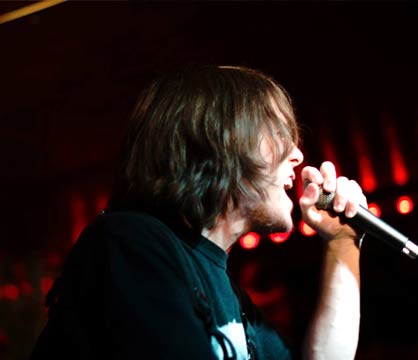 From his early days, it seems Ferrell Martin was always a self-starter, an independent spirit. So it comes as little surprise that when he decided to pursue a career in music as a rapper and MC, he took personal responsibility for getting where he wanted to go.
“I work for everything I have,” says Ferrell. “I started working at pizza places when I was about 16, and just made enough [to buy] gear ever since I was a kid basically.”
That go-getter attitude prompted him to start his own small business as a bicycle rickshaw driver in downtown Austin, making money to go toward his career and paying for his own recordings out of his earnings. When he started getting frustrated by the time crunch of buying time at local studios (and in some cases, the bad mixes he was getting), Ferrell decided it was time to learn audio engineering himself. “I wanted to have control over my own legacy,” he says. “I just want the creative process to be open. I am not trying to confine myself to this and this. I’d rather just do it at my own pace, my way.”
A friend of Ferrell’s happened to be a Recording Connection graduate and suggested he check it out. He decided to enroll, and true to form, he saved up his own money to pay the tuition in full. He was placed as an apprentice with Nick Joswick at 5th Street Studios in Austin, and despite the fact that the Ferrell and Nick came from two different places musically, Ferrell felt connected right away.
“[Nick] knew what he was doing,” says Ferrell. “He is in more in the realm of recording and engineering bands like full bands…Even though I am more of a hip-hop guy, and what I am going to be doing is more or less like mixing down beats and stuff like that, I still just thought that what he did was awesome. He does what he does well. He’s also an artist, too. That was one of the things that I really respected…For me, that was big, the fact that my mentor is a musician, plus he was always just so nice to me, he was always just really cool with me. It’s like he cared about my life.”
From his early days, it seems Ferrell Martin was always a self-starter, an independent spirit. So it comes as little surprise that when he decided to pursue a career in music as a rapper and MC, he took personal responsibility for getting where he wanted to go.
“I work for everything I have,” says Ferrell. “I started working at pizza places when I was about 16, and just made enough [to buy] gear ever since I was a kid basically.”
That go-getter attitude prompted him to start his own small business as a bicycle rickshaw driver in downtown Austin, making money to go toward his career and paying for his own recordings out of his earnings. When he started getting frustrated by the time crunch of buying time at local studios (and in some cases, the bad mixes he was getting), Ferrell decided it was time to learn audio engineering himself. “I wanted to have control over my own legacy,” he says. “I just want the creative process to be open. I am not trying to confine myself to this and this. I’d rather just do it at my own pace, my way.”
A friend of Ferrell’s happened to be a Recording Connection graduate and suggested he check it out. He decided to enroll, and true to form, he saved up his own money to pay the tuition in full. He was placed as an apprentice with Nick Joswick at 5th Street Studios in Austin, and despite the fact that the Ferrell and Nick came from two different places musically, Ferrell felt connected right away.
“[Nick] knew what he was doing,” says Ferrell. “He is in more in the realm of recording and engineering bands like full bands…Even though I am more of a hip-hop guy, and what I am going to be doing is more or less like mixing down beats and stuff like that, I still just thought that what he did was awesome. He does what he does well. He’s also an artist, too. That was one of the things that I really respected…For me, that was big, the fact that my mentor is a musician, plus he was always just so nice to me, he was always just really cool with me. It’s like he cared about my life.”
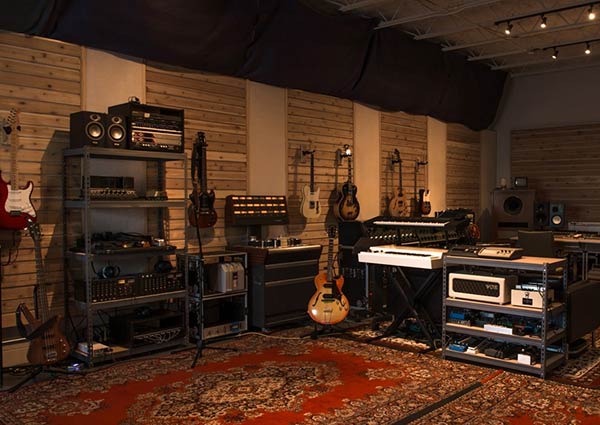 About midway through his apprenticeship course, an incredible opportunity came out of left field: an invitation to go on tour with popular electro-soul act Fifth Nation. Ferrell found himself at a crossroads. “I wanted to improve my education and learn how to mix and master,” he says, “but at the same time I am an artist. I want to give everything I can to my art, and my art started working out. [But] I still wanted to learn those skills.”
Thankfully, due to the flexibility of the apprenticeship program, Ferrell didn’t have to choose between a career-forming opportunity and finishing his education. “Nick was a really, really, understanding person, letting me do my thing with art and then being like, ‘Dude, I got you. I’m still going to teach you.'”
The two agreed to put Ferrell’s apprenticeship on hold while he went on tour with Fifth Nation—but meanwhile, several weeks now into the tour, Ferrell isn’t wasting the opportunity to continue learning from his experiences. “Fifth Nation…gave me the opportunity of a lifetime,” he says. “They put together most of the touring stuff. It’s a duo, and the male of this duo is Musik Read. He is an excellent sound engineer. He has been just breaking me off with wisdom the whole way.”
When his tour commitments wrap up this spring, Ferrell says he plans to pick up where he left off with his apprenticeship. “I’m going to be shadowing Nick more than ever,” he says. “I want to just stand over his shoulder every single day and watch what he is doing. I really want to watch. I want to obviously go to my lessons, but I want to shadow more than ever.”
About midway through his apprenticeship course, an incredible opportunity came out of left field: an invitation to go on tour with popular electro-soul act Fifth Nation. Ferrell found himself at a crossroads. “I wanted to improve my education and learn how to mix and master,” he says, “but at the same time I am an artist. I want to give everything I can to my art, and my art started working out. [But] I still wanted to learn those skills.”
Thankfully, due to the flexibility of the apprenticeship program, Ferrell didn’t have to choose between a career-forming opportunity and finishing his education. “Nick was a really, really, understanding person, letting me do my thing with art and then being like, ‘Dude, I got you. I’m still going to teach you.'”
The two agreed to put Ferrell’s apprenticeship on hold while he went on tour with Fifth Nation—but meanwhile, several weeks now into the tour, Ferrell isn’t wasting the opportunity to continue learning from his experiences. “Fifth Nation…gave me the opportunity of a lifetime,” he says. “They put together most of the touring stuff. It’s a duo, and the male of this duo is Musik Read. He is an excellent sound engineer. He has been just breaking me off with wisdom the whole way.”
When his tour commitments wrap up this spring, Ferrell says he plans to pick up where he left off with his apprenticeship. “I’m going to be shadowing Nick more than ever,” he says. “I want to just stand over his shoulder every single day and watch what he is doing. I really want to watch. I want to obviously go to my lessons, but I want to shadow more than ever.”
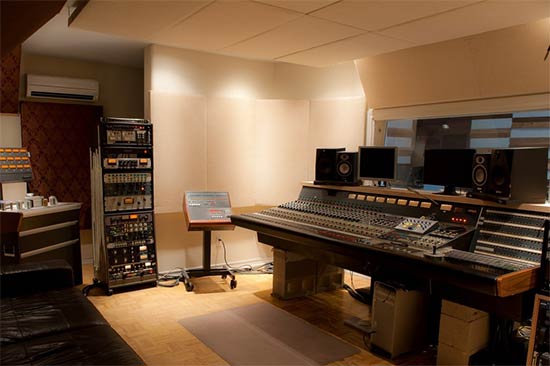 Ferrell’s experience underscores the advantages of learning the music industry on-the-job, especially for self-starters who are taking charge of their own careers—not only because the low cost of apprenticeship makes it affordable for independent artists like Ferrell to pay in full (an impossibility for a lot of other schools), but also because the flexibility allows up-and-comers to work their training around their careers.
“The structure of the Recording Connection was really attractive because I knew that it wasn’t exactly like a “school” school,” Ferrell says. “It was more of like a tailor-made fit. That came true more than I could have imagined…The fact that I’m able to live my life the way I am and still be able to come back is really awesome. I don’t think any other program could have offered me that. If I were enrolled in a [traditional] school, I’d be screwed right now.”
Check out some of Ferrell Martin’s work (under his industry moniker Feral the Earthworm) in the Apprentice Media section below!
Ferrell’s experience underscores the advantages of learning the music industry on-the-job, especially for self-starters who are taking charge of their own careers—not only because the low cost of apprenticeship makes it affordable for independent artists like Ferrell to pay in full (an impossibility for a lot of other schools), but also because the flexibility allows up-and-comers to work their training around their careers.
“The structure of the Recording Connection was really attractive because I knew that it wasn’t exactly like a “school” school,” Ferrell says. “It was more of like a tailor-made fit. That came true more than I could have imagined…The fact that I’m able to live my life the way I am and still be able to come back is really awesome. I don’t think any other program could have offered me that. If I were enrolled in a [traditional] school, I’d be screwed right now.”
Check out some of Ferrell Martin’s work (under his industry moniker Feral the Earthworm) in the Apprentice Media section below!
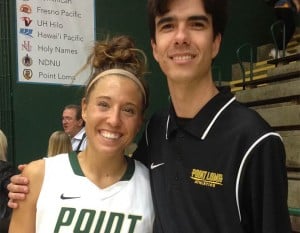 Radio Connection apprentice Callan McClurg is the online play-by-play voice for the Point Loma Nazarene University Sea Lions Baseball team AND recently wrote up a story on Jessica Escorza, senior guard for PLNU’s Women’s Basketball team! Callan is all-over sports!
Radio Connection apprentice Callan McClurg is the online play-by-play voice for the Point Loma Nazarene University Sea Lions Baseball team AND recently wrote up a story on Jessica Escorza, senior guard for PLNU’s Women’s Basketball team! Callan is all-over sports!
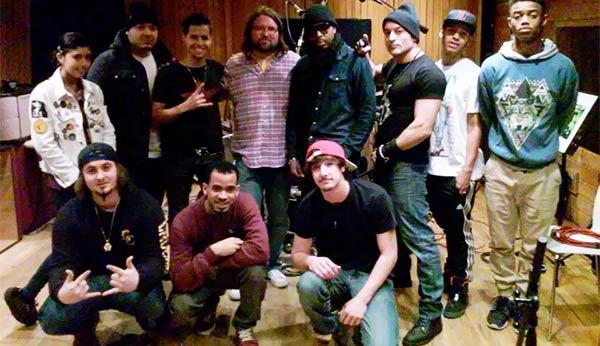 Recording Connection apprentices with Sax DMA’s Terminus Recording Studios in New York City recently got to soak up the knowledge of legendary Chief Engineer Mark Everton Gray (of Studio at the Palms in Las Vegas) as he taught the group about tracking drums. Class also included drummer Leonardo Piragibe Freire and AMG/Universal Recording artist Sharrief.
Recording Connection apprentices with Sax DMA’s Terminus Recording Studios in New York City recently got to soak up the knowledge of legendary Chief Engineer Mark Everton Gray (of Studio at the Palms in Las Vegas) as he taught the group about tracking drums. Class also included drummer Leonardo Piragibe Freire and AMG/Universal Recording artist Sharrief.
 Recording Connection graduate Wes Turner of Los Angeles, CA, is releasing Marc Payne project called The Gap Year to generate buzz for a movie of the same name!
Recording Connection graduate Wes Turner of Los Angeles, CA, is releasing Marc Payne project called The Gap Year to generate buzz for a movie of the same name!
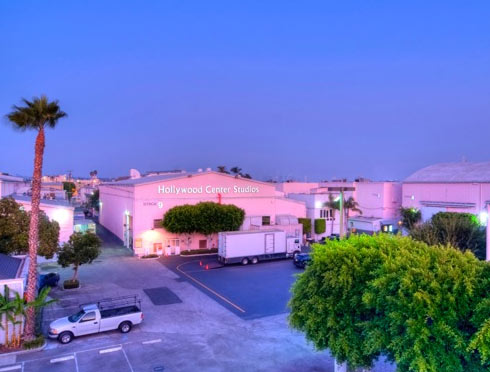 Last week, the Recording Connection’s Jimi Petulla and Brian Kraft headed over to the legendary Hollywood Center Studios to meet with Sound Design Corporation founder and owner Paul Sandweiss. Located on the historic lot where such iconic television shows such as I Love Lucy, The Addams Family, The Beverly Hillbillies, Jeopardy! and the Cosby Show; and popular Hollywood films such as The Karate Kid, When Harry Met Sally, Misery, and The Player were shot, Sound Design Corporation is Hollywood’s premier post-production audio facility and a leading provider of audio systems for television series and specials.
Paul, Jimi and Brian discussed the current state of the industry, and Paul shared his unique perspective on the importance of work ethics and turning out a quality product/production, how to interface with clients, knowing how to think on your feet and deal with challenging situations, and what is really important to an employer when considering bringing on an apprentice into their business. “Paul is one of the most knowledgeable and interesting people we have ever spent time with,” stated Kraft. “Paul’s career spans so many facets of our industry — from his early days working at the renowned Wally Heider Recording learning the in’s and out’s of the studio and the remote recording industry, to post-production, to mixing live-for-broadcast specials, series, and award shows including The Oscars, The American Music Awards, The BET Awards, The Billboard Music Awards, The Emmy Awards, GRAMMY® Nominations Concert Live, The MTV Awards, BET’s Sunday Best, The Superbowl Halftime Special – this guy has done and continues to do it all.”
“I really like the concept of a mentoring program,” stated Sandweiss. “What better way to get a real-world education, information and knowledge, then to apprentice under someone who is working every day in the field. It’s how I grew up learning in this industry and it’s the foundation that allowed me to develop a successful career. There is no substitute for learning from someone who is in the game daily…”
The Recording Connection is currently in discussions with Paul on how we can possibly be working together — stay tuned this could be BIG!
Last week, the Recording Connection’s Jimi Petulla and Brian Kraft headed over to the legendary Hollywood Center Studios to meet with Sound Design Corporation founder and owner Paul Sandweiss. Located on the historic lot where such iconic television shows such as I Love Lucy, The Addams Family, The Beverly Hillbillies, Jeopardy! and the Cosby Show; and popular Hollywood films such as The Karate Kid, When Harry Met Sally, Misery, and The Player were shot, Sound Design Corporation is Hollywood’s premier post-production audio facility and a leading provider of audio systems for television series and specials.
Paul, Jimi and Brian discussed the current state of the industry, and Paul shared his unique perspective on the importance of work ethics and turning out a quality product/production, how to interface with clients, knowing how to think on your feet and deal with challenging situations, and what is really important to an employer when considering bringing on an apprentice into their business. “Paul is one of the most knowledgeable and interesting people we have ever spent time with,” stated Kraft. “Paul’s career spans so many facets of our industry — from his early days working at the renowned Wally Heider Recording learning the in’s and out’s of the studio and the remote recording industry, to post-production, to mixing live-for-broadcast specials, series, and award shows including The Oscars, The American Music Awards, The BET Awards, The Billboard Music Awards, The Emmy Awards, GRAMMY® Nominations Concert Live, The MTV Awards, BET’s Sunday Best, The Superbowl Halftime Special – this guy has done and continues to do it all.”
“I really like the concept of a mentoring program,” stated Sandweiss. “What better way to get a real-world education, information and knowledge, then to apprentice under someone who is working every day in the field. It’s how I grew up learning in this industry and it’s the foundation that allowed me to develop a successful career. There is no substitute for learning from someone who is in the game daily…”
The Recording Connection is currently in discussions with Paul on how we can possibly be working together — stay tuned this could be BIG!
 An expert in commercial film production, Film Connection mentor Steve Carmichael has played a key role for the past several years in training our film apprentices in the Atlanta area. Steve currently does production work with Rite Media Group in Atlanta—a progressive film collective that (interestingly enough) was founded by one of his former students! In a recent conversation with RRFC, Steve shared a few key truths about the film business that he emphasizes with his students, along with a story or two to underscore his points. We thought we’d share some of these snippets with you.
An expert in commercial film production, Film Connection mentor Steve Carmichael has played a key role for the past several years in training our film apprentices in the Atlanta area. Steve currently does production work with Rite Media Group in Atlanta—a progressive film collective that (interestingly enough) was founded by one of his former students! In a recent conversation with RRFC, Steve shared a few key truths about the film business that he emphasizes with his students, along with a story or two to underscore his points. We thought we’d share some of these snippets with you.
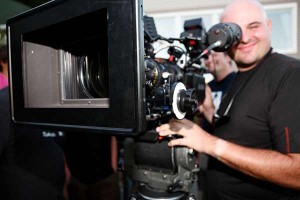 ON LEARNING FROM NEGATIVE FEEDBACK: “I have to get feedback on my students when they’re working on a production…Being alert and waiting for someone to get your attention, it’s not the same as being all over everybody. That’s one of the things that I have to impress on them. When I get feedback from a director or producer about, ‘Well, they were just in everybody’s face every minute,” I say, ‘I cautioned them about that.’ And then, I will thank them. I’m never scary when I give [my students] feedback, but their future depends on this, and I want them to do well. So I have to give them the feedback in a serious, respectful way.”
ON WHAT HE LEARNED FROM HIS OWN MENTORS: “When I worked in California, I worked in set lighting [with] a gaffer who primarily worked at Universal. He loved being a mentor, and he would not only explain what things were but the principles behind it. His name was Doug. I use stuff that Doug taught me with these students all the time. It doesn’t have to be about lighting. I do use it for the lighting part of the course, but it’s also how you stand ready, anticipate what might happen, be ready for that, or anything else. It’s just a practice.”
ON LEARNING FROM NEGATIVE FEEDBACK: “I have to get feedback on my students when they’re working on a production…Being alert and waiting for someone to get your attention, it’s not the same as being all over everybody. That’s one of the things that I have to impress on them. When I get feedback from a director or producer about, ‘Well, they were just in everybody’s face every minute,” I say, ‘I cautioned them about that.’ And then, I will thank them. I’m never scary when I give [my students] feedback, but their future depends on this, and I want them to do well. So I have to give them the feedback in a serious, respectful way.”
ON WHAT HE LEARNED FROM HIS OWN MENTORS: “When I worked in California, I worked in set lighting [with] a gaffer who primarily worked at Universal. He loved being a mentor, and he would not only explain what things were but the principles behind it. His name was Doug. I use stuff that Doug taught me with these students all the time. It doesn’t have to be about lighting. I do use it for the lighting part of the course, but it’s also how you stand ready, anticipate what might happen, be ready for that, or anything else. It’s just a practice.”
 ON HOW GREAT LIGHTING CAN IMPACT FILM, AND A RECENT EXAMPLE OF GREAT LIGHTING IN FILM: “One is very recent, and it was nominated for best foreign film this year. It’s called Ida. It’s a Polish film shot in black and white on an ARRI Alexa [a digital camera]. I thought I was going to faint at the absolute beauty of it. I’ve never seen a film shot like this, especially black and white. I’m a lover of film, like so many people…It’s a very small film. You’d figure in the credits on the electrics crew, you’re going to see one, one, and five; gaffer, best boy, and three operators. It’s seven electricians on this film, on this tiny little film.
ON THE IMPORTANCE OF LISTENING TO THE CLIENT WITHOUT PRIOR EXPECTATIONS, AND WHAT CAN HAPPEN WHEN YOU JUST LISTEN: “I’ll give you an example. I had to do a short documentary on the history of the Russian Orthodox Church. I thought the client was to introduce a show of Russian iconic art, which was coming to Atlanta. I thought, ‘Well, they’re going to cheap out on this thing. They’re going to wait until the art gets here. We’ll shoot a lot of close-ups of it. I’ll write eight minutes worth of voiceover. We’ll find some Russian sacred music; done for 10,000 bucks.’ So I went into the first meeting with the client with that as an expectation, always a dangerous thing to do in this business. You never have expectations.
ON HOW GREAT LIGHTING CAN IMPACT FILM, AND A RECENT EXAMPLE OF GREAT LIGHTING IN FILM: “One is very recent, and it was nominated for best foreign film this year. It’s called Ida. It’s a Polish film shot in black and white on an ARRI Alexa [a digital camera]. I thought I was going to faint at the absolute beauty of it. I’ve never seen a film shot like this, especially black and white. I’m a lover of film, like so many people…It’s a very small film. You’d figure in the credits on the electrics crew, you’re going to see one, one, and five; gaffer, best boy, and three operators. It’s seven electricians on this film, on this tiny little film.
ON THE IMPORTANCE OF LISTENING TO THE CLIENT WITHOUT PRIOR EXPECTATIONS, AND WHAT CAN HAPPEN WHEN YOU JUST LISTEN: “I’ll give you an example. I had to do a short documentary on the history of the Russian Orthodox Church. I thought the client was to introduce a show of Russian iconic art, which was coming to Atlanta. I thought, ‘Well, they’re going to cheap out on this thing. They’re going to wait until the art gets here. We’ll shoot a lot of close-ups of it. I’ll write eight minutes worth of voiceover. We’ll find some Russian sacred music; done for 10,000 bucks.’ So I went into the first meeting with the client with that as an expectation, always a dangerous thing to do in this business. You never have expectations.
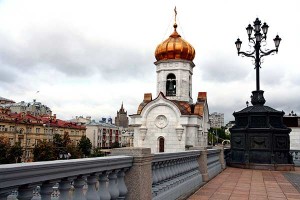 “By the end of the first meeting, they’re sitting there, and I’m not pushing that idea or proposing it; I’m kind of listening. That’s the most important thing in initial meetings with clients or producers, is to just listen. By the end of the meeting [they said], ‘Steve, we’re thinking we can’t do this film unless we send you to Russia. I’m sitting there. This a childhood dream I’ve had forever. I love Russia, its history, and culture. I know a fair amount about it, and I’m about to pass out. I don’t know what to do here. They said, ‘We’ll have a meeting again in a week. Why don’t you do a budget based on your going there, using a crew in Russia, and spending about three weeks there?’ I thought, This won’t come true. They’re going to see the numbers, and fire me…
“At the end of the second meeting, they said, ‘Well, you need to start making plans to go to Moscow.’ That was one of the happiest days in my life. I got to go there, work with a Russian crew, do a story that was different. It was a documentary format. Very short film, it was eight minutes long. It cost them $60,000. I started out at $10,000, staying in Atlanta. What a ridiculous idea. So their expectations were much higher than I thought they would be.”
“By the end of the first meeting, they’re sitting there, and I’m not pushing that idea or proposing it; I’m kind of listening. That’s the most important thing in initial meetings with clients or producers, is to just listen. By the end of the meeting [they said], ‘Steve, we’re thinking we can’t do this film unless we send you to Russia. I’m sitting there. This a childhood dream I’ve had forever. I love Russia, its history, and culture. I know a fair amount about it, and I’m about to pass out. I don’t know what to do here. They said, ‘We’ll have a meeting again in a week. Why don’t you do a budget based on your going there, using a crew in Russia, and spending about three weeks there?’ I thought, This won’t come true. They’re going to see the numbers, and fire me…
“At the end of the second meeting, they said, ‘Well, you need to start making plans to go to Moscow.’ That was one of the happiest days in my life. I got to go there, work with a Russian crew, do a story that was different. It was a documentary format. Very short film, it was eight minutes long. It cost them $60,000. I started out at $10,000, staying in Atlanta. What a ridiculous idea. So their expectations were much higher than I thought they would be.”

RRFC is education upgraded for the 21st century.
Get the latest career advice, insider production tips, and more!
Please fill out the following information, and RRFC Admissions will contact you to discuss our program offerings:
Stay in the Loop: Subscribe for RRFC news & updates!
© 2025 Recording Radio Film Connection & CASA Schools. All Rights Reserved.



